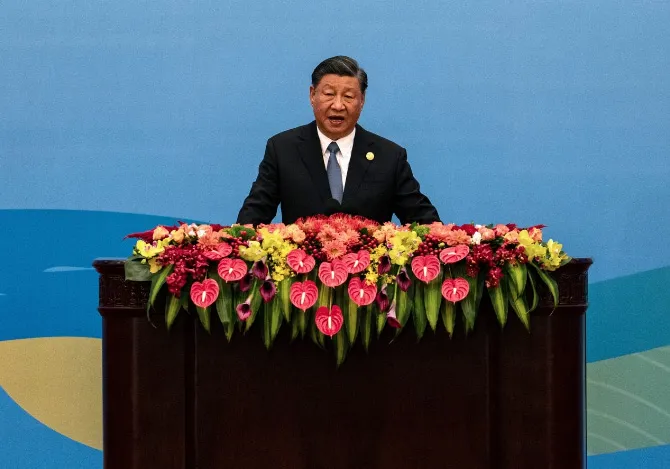-
CENTRES
Progammes & Centres
Location
Xi seems to have overplayed his hand, leading to a significant realignment, resulting in a pushback at a time when his governance style has come under scrutiny

For the Chinese people, 2023 is the ‘year of the rabbit’ meant to bring in prosperity, on the contrary there have been a series of bad tidings. China’s population declined for the first time in nearly six decades, joblessness reached record highs that prompted the regime to stop publishing statistics. A crackdown on financing of the real estate sector has affected an important driver of China’s economy. Summary detention of businesspeople over allegations of spying, coupled with expansion of the provisions of the anti-espionage law has vitiated investment climate. To add to the doom, foreign firms are scaling down operations in China and affluent Chinese moving their wealth abroad, signifying that the nation’s allure is waning.
A crackdown on financing of the real estate sector has affected an important driver of China’s economy.
On the back of that Xi faces significant headwinds within the Communist Party of China (CPC). His hand-picked protégé, ex-Foreign Minister Qin Gang, has had a sudden fall after a meteoric rise. A purge in the People’s Liberation Army (PLA) has felled top generals in the elite Rocket Force, and former Defence Minister Li Shangfu. Even as a renewed push for the anti-corruption campaign hangs like a sword of Damocles over the CPC brass, the sudden demise of Xi’s former No. 2, ex-Premier Li Keqiang, barely months after demitting office generated disquiet within the Party. Both these internal crises have been as a result of Xi’s mercurial style of governance. First, the prolonged lockdowns on account of Xi’s zero-Covid strategy, followed by the abrupt lifting of curbs due to protests in Chinese cities not only hurt economic activity but also hit the CPC’s credibility. Early this year, the coastal province of Zhejiang reported an increase of 73% in cremations during the first quarter of this year compared to the same period in 2022, later the internet was scrubbed clean of all references to these statistics. Second, the removal of presidential term limits and leaving the succession question open ensures that Xi holds all the levers of power seemingly in perpetuity, thwarting the ambitions of a host of second- and third-rung leaders and creating a political stasis in Zhongnanhai—China’s elite leadership precincts.
Similarly on the international front, Xi stoked disputes with neighbours over South China Sea, amassed troops along the Indian border, announced his intention to annex Taiwan, and ratchetted up tensions against Japan, the last two being US allies. Xi’s sabre-rattling was countered by a sustained pushback from the West on several fronts. First, America reinvigorated the NATO alliance, deepened ties with China’s neighbours—India, Japan, Vietnam. In the long-term, the defence cooperation pact between Australia, the United Kingdom, and the US that aims at developing nuclear submarines, and collaborate on advanced technologies like autonomous underwater vehicles, quantum technology, artificial intelligence, advanced cyber capabilities, and electronic warfare has the potential to alter the balance of power in the Indo-Pacific vis-à-vis China. Second, the West has also instituted export curbs on semiconductor technology, and constraints on outbound investment into advanced technology sectors in China. In international relations, it is important for statesmen to know when to wage war in national interest, and more importantly, when to make peace to safeguard the same. The phalanx of challenges both internal and external have compelled Xi, who once brandished a “China option”— denoting a Beijing-centric order as an alternative to the existing Washington-led arrangement—to reach out to European leaders and US President Joe Biden. Xi is trying to defuse tensions with the Old Continent where there are disputes brewing over trade imbalance, and other issues. Italy, one of the only G7 country to join Xi’s signature Belt and Road Initiative (BRI), has got off the bandwagon. The European Union has been calling for member-nations to derisk from China for security reasons, opened an inquiry on subsidies related to imports of Chinese electric vehicles. Xi has pitched for more dialogue following which working groups have been set up to ease the trade rows.
Xi is trying to defuse tensions with the Old Continent where there are disputes brewing over trade imbalance, and other issues.
Climbing down from the high horse, China proposed to the US the necessity to “accommodate development” and “mutual prosperity” of their respective nations. Xi’s spiel to American audiences during his recent trip to the US for the APEC summit was that China does not intend to challenge the US or replace it, and that his nation was a big beneficiary of the current international order. China and the US agreed to restart channels of communications between their militaries, which had been severed by a furious Xi following then-House Speaker Nancy Pelosi’s trip to Taipei in August 2022. Xi also pledged to improve cooperation in combatting narcotics, signalling a modest reset in Sino-US relations.
Xi seems to have overplayed his hand that has led to a significant realignment of nations, resulting in a pushback, at a time when his governance style back home has come under scrutiny. Questions will linger as to whether or not Xi’s push for global leadership was ill-timed, or if China is simply buying more time to rebuild its depleted resources to mount a fresh challenge to the global order at a time of its picking. Let’s not forget Chinese strategist Sun Tzu’s dictum: Warfare is based on deception, when able to attack, give the impression of being unable.
This commentary originally appeared in Hindustan Times
The views expressed above belong to the author(s). ORF research and analyses now available on Telegram! Click here to access our curated content — blogs, longforms and interviews.

Professor Harsh V. Pant is Vice President – Studies and Foreign Policy at Observer Research Foundation, New Delhi. He is a Professor of International Relations ...
Read More +
Kalpit A Mankikar is a Fellow with Strategic Studies programme and is based out of ORFs Delhi centre. His research focusses on China specifically looking ...
Read More +